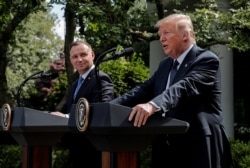There may be some additional competition for the thousands of U.S. troops that could soon be on their way out of Germany.
Poland is already in line to receive some of the 9,500 troops that U.S. President Donald Trump plans to withdraw from Germany following disagreements over defense spending levels. Now, Latvia says it, too, would like to be under consideration.
Latvian Defense Minister Artis Pabriks said Thursday that his country is willing to host U.S. forces, though he hopes it will not have to be at Germany’s expense.
"We are ready to invest, to receive also a certain amount of American troops on Latvian soil,” he said during the virtual European Union Defense Forum.
“We are not trying here to punish Germans,” Pabriks added. “We understand there must be a push for Germans to do more, but a presence in Germany is vital for global security.”
"Bring your troops here - they will enjoy it" #Latvia DefMin @Pabriks tells #EUDefense
— Jeff Seldin (@jseldin) July 9, 2020
Germany is currently home to about 38,600 U.S. troops and numerous installations, including Ramstein Air Base and five of the U.S. Army’s seven European garrisons. In addition, Stuttgart, Germany, is home to both the U.S. European Command and the U.S. Africa Command.
But Trump has grown increasingly frustrated with Germany over a number of issues, including its continuing failure to meet NATO’s defense spending requirements and over the $11 billion Nord Stream 2 pipeline, set to export natural gas directly from Russia to Western Europe.
“They're spending billions of dollars to buy Russian energy, and then we're supposed to defend them from Russia,” Trump said while hosting Polish President Andrzej Duda at the White House last month.
Still, European officials are wary, concerned that the withdrawal of U.S. forces from Germany could lead to a reduction of the U.S. presence on the continent.
“If I'm asked by anybody if I am ready that Poland receives more U.S. troops in our country, of course, I am ready,” Duda said during his stop in Washington.
But he added, “I requested Mr. President that he would not withdraw U.S. forces from Europe, because the security of Europe is very important to me.”
Latvian officials, likewise, want to see U.S. forces stay in Europe.
“We think that American military presence in Europe actually should be increased and not decreased,” Defense Minister Pabriks said Thursday, suggesting deployments at various possible sites in Northern Europe, the Baltics or Poland could all serve to better contest what Washington’s European allies see as a growing Russian threat.
Germany, while not happy with the prospect of losing U.S. forces, appears to be resigned to some reduction of the U.S. military footprint but seems to hold out hope that if troops do leave, they will not go too far.
"What we are discussing is the security of the (NATO) alliance,” German Defense Minister Annegret Kramp-Karrenbauer said Wednesday. “If they [U.S. troops] were redeploying within Europe, then that would mean that the strong commitment of the United States in the transatlantic partnership and the focus on Europe would remain, and that would be an important message.”
U.S. defense officials say that under the current proposal, the military footprint in Europe will become more flexible, enhancing the ability of NATO to push back against Moscow.
But some former U.S. military officials warn that any redeployment would be a mistake, especially with intelligence suggesting that Russia may have paid bounties for Taliban militants to target U.S. and coalition forces in Afghanistan.
“With respect to Russia, we should suspend any troop withdrawals from Germany,” retired General John Nicholson, the former commander of U.S. Forces-Afghanistan, told lawmakers Thursday.
"These troop withdrawals play into Russian desires to undermine and weaken NATO,” he said. "If carried out despite these bounties, this will be viewed as a sign of American weakness in the face of Russian threats."







